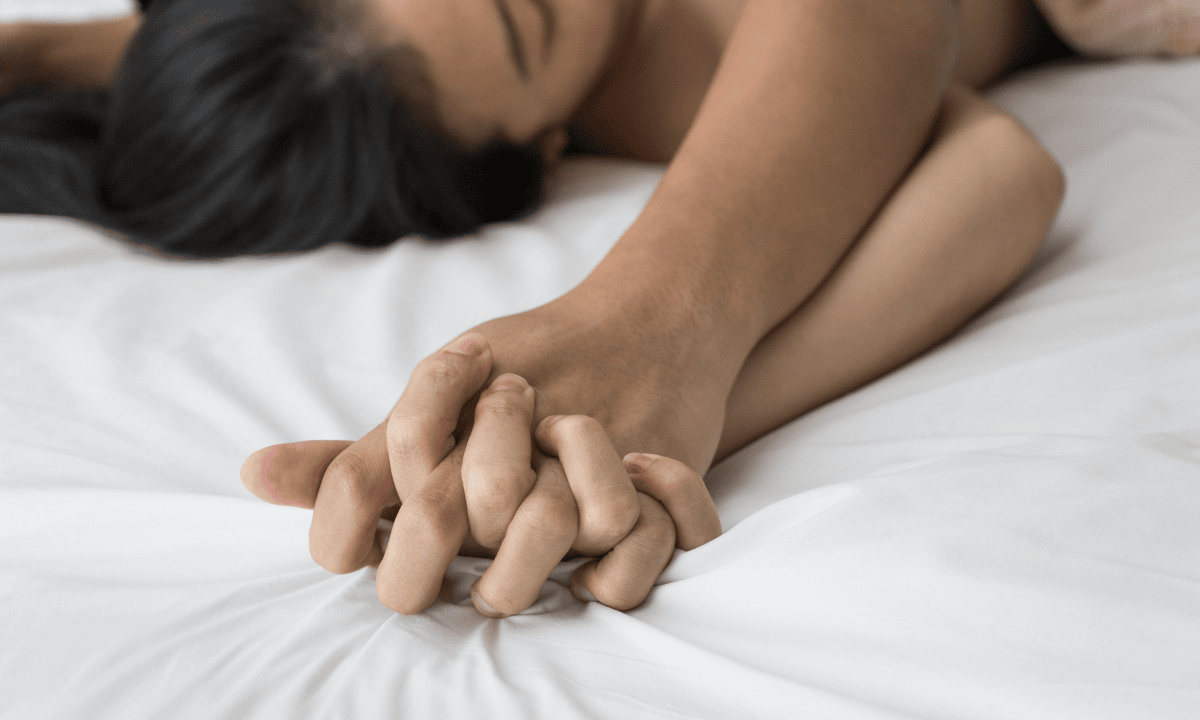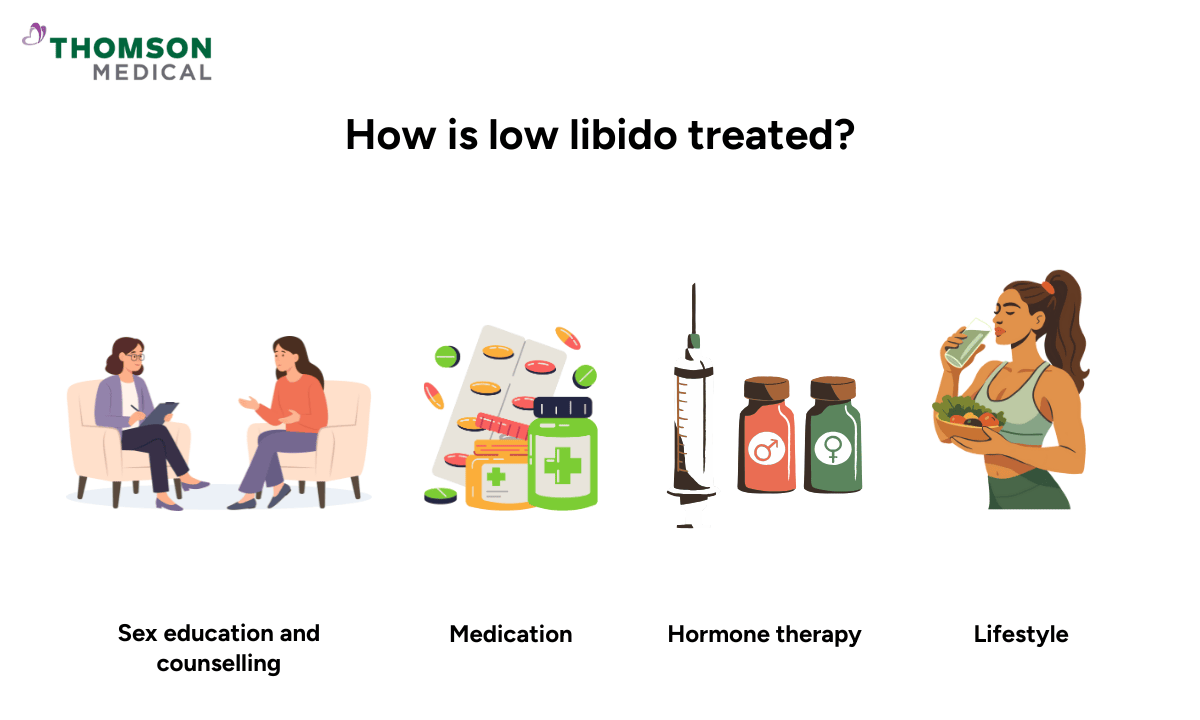Some days you feel desire, other days, you don't. If you're wondering whether there’s something wrong with you, rest assured, because changes in sex drive are completely normal. Sexual desire doesn't work like a simple on-off switch, so knowing what influences yours can help you take more control of your sexual life.
What is sex drive?

Sex drive, also known as libido, is your natural desire for sexual activity. It's influenced by your hormone levels, emotional health, stress, and connection with your partner. While men's libido is often linked to testosterone hormone levels, women's sexual interest can change more often, even from month to month.
How does female sex drive change over the years?
Sex drives naturally change with age, lifestyle, and hormones. Understanding these changes helps you know what's normal for you and when to get help.
Your hormones play a big part in how your sex drive changes over time, especially oestrogen and testosterone. Oestrogen helps maintain vaginal health, natural lubrication, and blood flow. When oestrogen levels drop, especially around menopause, many people notice a lower libido or vaginal dryness.
Meanwhile, testosterone is often thought of as a “male” hormone, but women also produce it, though in smaller amounts. It still plays an important role in sexual desire, arousal, and sensitivity. Low levels of testosterone can sometimes make it harder to feel interested in or excited by sex.
In your 20s
Your oestrogen and testosterone levels are generally at their peak, which can increase your sexual desire. This stage is also a time when you start to understand your body, your emotions, and what helps you feel close to a partner.
However, stress, tiredness, or emotional strain from daily activities can sometimes lower your interest in sexual intercourse. Research shows that women’s desire can be more sensitive to fatigue and daily stress. It's important to remember that these changes are temporary and completely normal.
In your 30s and early 40s
Biologically, testosterone levels begin to decline slightly from the late twenties, but this doesn’t necessarily reduce your desire. In fact, this stage often brings more satisfaction and confidence because of experience and better communication with partners.
During and after having children
Pregnancy and childbirth bring major hormonal changes. If you're a new mother, you often feel tired, overwhelmed, or focused on caring for your baby, leaving less time and energy for intimacy. You may also experience vaginal dryness, pelvic discomfort, or pain from a caesarean wound, which can make intimacy feel uncomfortable for a while.
In your 50s and beyond
As you reach menopause, your hormone levels fall, reducing natural lubrication and sometimes causing discomfort during sexual activity. However, this does not mean that your sexual desire disappears. In fact, many women find new forms of intimacy and pleasure in this stage.
If you’re unsure whether your changes in desire are normal or require medical attention, request a consultation with Thomson Medical. Our specialist can help you understand what’s happening with your body and provide a personalised care.
What causes changes in sex drive?
It's normal for your sexual drive to change from time to time. These changes can come from your body, hormones, or emotions.
Physical causes
Chronic health conditions like diabetes, kidney disorders, arthritis, and heart disease can lower sex drive. Similarly, some medications, especially antidepressants and blood pressure drugs, may cause loss of libido.
Menstrual cycle
Your menstrual cycle plays a key role in sexual arousal. Many women feel a stronger sexual interest around ovulation, which is when testosterone and oestrogen levels peak. On the other hand, before your period, bloating or mood changes may lower your desire for a while. You may feel more sensitive or less interested in intimacy during your period, while others may not notice any change.
Hormone
Your hormone levels play a big role in your sex drive. During pregnancy, higher oestrogen and progesterone levels can either boost or reduce sexual activity. Meanwhile, after childbirth, your oestrogen drops while stress hormones and prolactin (a hormone that supports breastfeeding) rise. A rise in prolactin often lowers testosterone levels, which can cause low libido during this time.
Similarly, during menopause, dropping hormone levels may lead to vaginal dryness and discomfort during intercourse.
Psychological causes
Your emotional wellbeing matters just as much as your physical health. High stress, along with anxiety or depression, can lower sexual desire. Likewise, relationship problems or feeling emotionally distant can also impact sexual attraction to your partner.
Our specialist
Loading...
What are the symptoms related to low libido?
It's common for women to lose interest in sexual activity at different stages of life. However, when low libido lasts and causes you distress, you may need professional attention.
You may notice:
Little or no sexual thoughts or fantasies
Rarely wanting intimacy or sexual activity
Fewer physical sensations during sexual arousal
Worry or sadness about your loss of libido
Discomfort or pain during intimacy due to pelvic floor weakness
If your symptoms continue or start affecting your daily life, it's important to reach out to your doctor or a sex therapist for support.
When should you see a doctor for low libido?
If your low libido causes you distress, affects your relationship, or appears suddenly without a clear reason, it's best to seek advice. A doctor can help find the cause, whether it's hormonal, medical, or emotional.
Depending on your situation, your doctor may suggest blood tests to check hormone levels, review your medications, or recommend counselling or therapy.
How is low libido treated?

Managing low libido depends on its cause. Treatment may include lifestyle changes, counselling, or medical options.
Sex education and counselling
Learning more about your body and sexual desire can ease unnecessary worry. Counselling, either alone or with your partner, helps improve communication and rebuild intimacy. Additionally, a sex therapist can help you address past experiences, relationship stress, or emotional blocks that may affect your sexual interest.
Medication
If certain medicines are lowering your sex drive, your doctor may adjust your prescription or dosage. In some cases, treatments such as topical creams for vaginal dryness or medication for low sexual desire can help improve your comfort and arousal.
Hormone therapy
For women experiencing hormonal imbalances, hormone therapy may be recommended. This can help relieve symptoms like vaginal dryness, hot flashes, and other changes that affect sexual activity. In some cases, low-dose testosterone therapy may also be considered under specialist care.
Lifestyle
Regular exercise improves mood and blood flow, while good sleep and balanced meals support steady hormone levels. Managing stress through relaxation techniques, staying emotionally connected with your partner through open communication, and using lubricants for comfort can all help restore your natural sexual desire.
If you’re experiencing low sexual interest despite treatment attempts, request an appointment with Thomson Medical. Our specialists can perform an evaluation to determine whether hormonal imbalance, medication, or stress is affecting your libido.
FAQ
What is a normal sex drive for a woman?
There's no single normal level of sex drive. Every woman is different, and libido changes with age, health, and life stage. Hormones, stress, sleep, and relationships all play a role. What matters most is whether you feel comfortable with your level of desire. Low or changing libido is common and only needs attention if it causes you distress.
When is a woman’s sex drive the highest?
Sexual desire often peaks around ovulation. During this time, oestrogen and testosterone levels rise, which can increase arousal. Some women in their thirties and forties also notice stronger desire due to confidence and experience. However, after childbirth or during menopause (the end of menstrual cycles), hormonal shifts can temporarily lower libido.
What triggers female sex drive?
Female libido is influenced by physical, emotional, and psychological factors. Hormones like oestrogen and testosterone affect arousal, while emotional closeness, feeling desired, and good communication strengthen it. Psychological factors such as anxiety, depression, or stress can lower sexual interest. For most women, feeling safe, loved, and relaxed often sparks interest more than physical touch alone.
How does hormonal imbalance affect sex drive in women?
Low levels of oestrogen, progesterone, or testosterone can reduce sexual interest. Low oestrogen may cause vaginal dryness, which makes intercourse uncomfortable. Tiredness, poor sleep, and mood swings linked to hormones can also lower desire. Fortunately, treating the cause of sexual dysfunction usually helps restore balance.
What are some ways for women to increase their sex drive?
Simple lifestyle changes can help. Regular exercise, enough sleep, and stress control improve energy and mood. Additionally, limiting alcohol and quitting smoking support hormone health. Talking openly with a partner strengthens connection. Also, lubricants can ease vaginal dryness, and if low libido continues, a doctor can check for hormonal or emotional causes.
What are the common signs of low sex drive in women?
The common signs of low sex drive in women include a lasting lack of interest in sex, fewer sexual thoughts, or trouble feeling aroused. Some women may feel less pleasure during sex, start avoiding intimacy, or feel distant from their partner when desire is low.
The information provided is intended for general guidance only and should not be considered medical advice. For personalised recommendations and tailored advice based on your unique situations, please consult a specialist at Thomson Medical. Request an appointment with Thomson Medical today.
Reference:
Harris, E. A., Hornsey, M. J., Hofmann, W., Jern, P., Murphy, S. C., Hedenborg, F., & Barlow, F. K. (2023). Does Sexual Desire Fluctuate More Among Women than Men? Archives of Sexual Behaviour,52(4), 1461-1478. https://doi.org/10.1007/s10508-022-02525-y
Delgado-Pérez, E., Rodríguez-Costa, I., Vergara-Pérez, F., Blanco-Morales, M., & Torres-Lacomba, M. (2022). Recovering sexuality after childbirth. What strategies do women adopt? A qualitative study. International Journal of Environmental Research and Public Health,19(2), 950. https://pmc.ncbi.nlm.nih.gov/articles/PMC8775547/
Glaser, R., & Dimitrakakis, C. (2013). Testosterone therapy in women: Myths and misconceptions. Maturitas, 74(3), 230–234. https://doi.org/10.1016/j.maturitas.2013.01.003
For more information, contact us:
Thomson Specialists (Women's Health)
Thomson Women's Clinic (TWC)
- Novena:
6592 6686 (Call), 8611 8986 (WA) - Bukit Batok:
6569 0668 (Call), 8686 3525 (WA) - Choa Chu Kang:
6893 1227 (Call), 8282 1796 (WA) Jurong:
6262 8588 (Call), 6262 8588 (WA)- Katong (female doctor):
6970 2272 (Call), 8611 9020 (WA) - Punggol:
6243 6843 (Call), 8811 0328 (WA) - Sembawang: 6753 5228
- Sengkang: 6388 8125
- Serangoon (female doctor): 6382 3313
- Tampines: 6857 6266
- Tiong Bahru: 6276 1525
